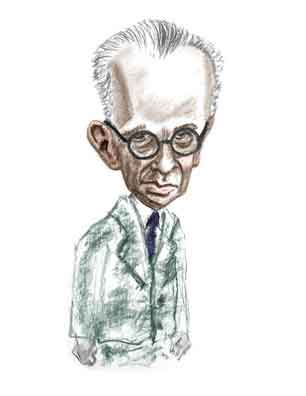Kurt Godel

Although sci-fi fans might prefer his equations where the universe rotates in time so that the future eventually returns to the past, Kurt Godel's big claim to fame was his "undecidability" theorem of 1931. Although the theorem is usually simplified for general consumption, Kurt's demonstration that there are true statements without proof has captured the public's imagination. Godel's theorem, we learn, is as important to mathematics, logic, and philosophy as Einstein's theory of relativity and Heisenberg's uncertainty principle are to physics.
Weeeeeeeeellllllllllll, not quite, say others - and that includes some hard core mathematicians. Kurt's theorem, they say, is very specific to number theory. Strictly speaking then, the theorem only proves that for a system that is sufficiently rich - that is, one that has enough rules - then there are well-formed formulas - in other words, mathematical expressions - that are true but cannot be proven within the system. As one mathematician recently pointed out, this means that Kurt proved as long as you use a sufficiently broad definition for the word "number", yes, there are true formulas without proof - again we stress - within that particular system. In brief, Kurt warned mathematicians to stay away from certain areas of mathematics, but most would never drift into those regions anyway. As it is, the majority of mathematicians, even those working in research, proceed through their careers with scarce a glance at what Kurt did, thank you.
So was Kurt one of the most profound thinkers in the history of mankind? Or is his theorem technically correct, but overrated?
Shoot, you don't think you'll learn that by looking at a cartoon website, do you? But you might learn a bit more about Kurt if you click here. And for a bit of an in-depth look at his famous theorem, click here
If the viewers will pardon a modest cough, this drawing was used as an illustration for the article, "Presque tout est indécidable" by Jean-Paul Delahaye and published in Pour La Science, the French edition of Scientific American.
Vive la France!